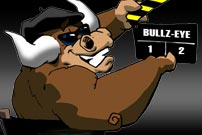 With the temperature dropping, it's time to find someone to keep you warm. Find your hookups with our online dating guide!
With the temperature dropping, it's time to find someone to keep you warm. Find your hookups with our online dating guide!
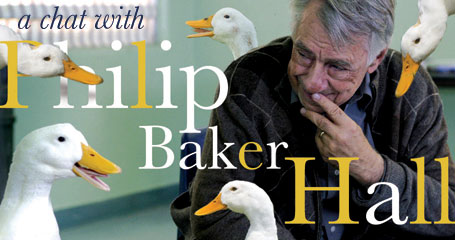
Interview date: 07/29/2008
Run date: 08/08/2008
Movies Home / Entertainment Channel / Bullz-Eye Home
He’s made a living in recent years as one of those definitively “gruff but loveable” actors, but while Philip Baker Hall’s role as the library cop on “Seinfeld” may still be considered his career touchstone for a lot of folks in the mainstream, he’s been a film staple since the 1980s, appearing in teen classics (“Say Anything,” “Three O’clock High,” “How I Got Into College”), action flicks (“The Rock,” “Air Force One,” “Enemy of the State”), and the majority of Paul Thomas Anderson’s oeuvre. Currently, Hall is promoting the DVD release of a small, underrated film called “Duck,” where he played opposite…well, a duck. It’s a mixture of drama and black comedy, but for its depressing moments, it has a lot of heart as well. Hall explained what it’s like to work with an animal co-star, expressed his considerable dissatisfaction with the way Fox treated his last TV series, “The Loop,” and even spoke about his recent commercial work for Holiday Inn as a Professor of Business Accommodations.
Bullz-Eye: Hey, Mr. Hall, how are you doing?
Philip Baker Hall: I’m doing well, Will. How are you doing?
BE: I’m doing great.
PBH: Where are you, Will?
BE: I’m in Norfolk, Virginia.
PBH: Oh, in Virginia! Okay!
BE: Well, I just finished watching “Duck” a little bit ago, and it was a very enjoyable little film.
PBH: It is. It’s a cute a film, yeah.
BE: What’s it like playing opposite a duck?
PBH: (Laughs) Well, what it means is that you have to learn 100 pages of dialogue yourself!
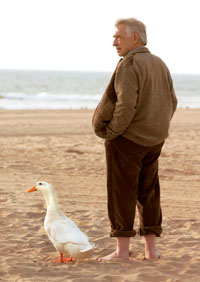
BE: Actually, I was going to ask if it was the equivalent of doing a monologue or if you were working out in your head how the duck might actually respond.
PBH: Well, you know, you kind of…yeah, you imagine his responses, but it is rather like doing a monologue. But, you know, he’s…I don’t know if you know this, it may be in some of the publicity material, but owing to the nature of animals in general in movies, ducks in particular, we had to have a lot of different ducks, and the fact is that that type of duck, when they’re mature, they all look pretty much alike. So we had access to the AFLAC ducks, and they have a big semi-trailer with very comfortable accommodations for about 50 ducks! In fact, that came to our set every day, wherever we were on location, and the director determined that some ducks were better for certain moods than others. So if we needed a duck that was nervous or sort of grouchy, that would be, like, #25 or something. And if we needed a duck that listened well quietly and seemed to be absorbing dialogue…I do remember, actually, that that was Duck #34. That was our main duck. So we had this selection of ducks to pick, depending on what the scene required. So it was not the same duck throughout. But even in big-budget Hollywood films, even if it’s about a dog, they would have several dogs that look alike, because, y’know, animals get tired just like people do. And, of course, they’re affected by noises and colors and maybe bad air conditioning.
BE: Was there an official duck wrangler?
PBH: Yes, there was. Actually, there were always two, and sometimes there were three. And anytime there are scenes with the duck in the movie, there is a wrangler just off camera, and these ducks…these AFLAC ducks…they’re highly trained actor ducks, and they’ve done a lot of stuff in movies, not just the AFLAC commercials. They’re in demand for any movies that feature ducks. So they’re very responsive to the trainers and to the method in which they’ve been trained. The trainer has a long…actually, it’s a collapsible rod, and they can put duck food in the tip of it. And this rod can be, like, 18 inches or it can be six or eight feet, depending on how much of it they extend. So not only is there a trainer just off camera, but he’s got the rod with the duck food in it, and that will be just barely at the tip of where the camera loses vision. So the duck, even though he may seem to be listening to me or responding to me, he’s really looking at that food… (Laughs) …and waiting for his chance. But, as I say, that’s typical of any movie that has animals. It was an experience for me, because I’d never done a movie like that, with an animal so prominently featured.
BE: How did you end up in this project in the first place? It seems like…well, I don’t know if it was character specifically tailor-made for you, but he certainly felt as though he could’ve been.
PBH: Um…I don’t think it was initially geared toward me. As I understand it from Nicole (Bettauer, director), when she wrote it, there were a few people she had in mind for it, but…my agent called me one day and said, “I have this very unusual script, and the director is interested in you for this.” I remember the agent saying, “I’m not going to tell you anything about this. I’m just going to send it to you and wait for your reaction. I think you’re going to like it, though. It’s charming.” But she didn’t tell me what it was about. But I did like it, and I met with Nicole and we agreed to go forward. I know that when I got that script, they were not that far from the first day of shooting. I didn’t have that much time to start working on it. You know, in the movie business, because of the need for locations and the need for financing and all these things for the directors and producers, once all these elements converge and they go, “Omigod, we’ve got the financing, we’ve got the permits from the city, we’ve got the approval and permission on our locations,” once all those things start to move toward their projected date, you’re pretty much committed. So you’ve got to have your casting in place by then, or you may run out of time, because it’s pretty hard to go backwards. If you’re supposed to start on the 15th and you get to the 15th and you say, “Well, we’re not quite through casting,” you may lose your permits! Permits are only good for a few days, or the city or the person who gave you a certain location or agreed to let you use it for a price might say, “Look, I only had a few open days there, and that’s it.” So you’ve gotta go when everything comes together. And I think, when they offered this role to me, it had probably been offered to someone else. I don’t know to whom it had been offered, but…there was so little time, is what I’m saying, from when they offered to me to the first day of shooting that I’ve always suspected that it was offered to somebody else… (Laughs) …who for whatever reason turned it down. But I’m glad they did, because I’m proud of the film and very glad that I had the opportunity to do it.
BE: Well, you fell into it very comfortably, that much is certain. And I’ve seen several people compared it favorably to David Lynch’s “The Straight Story,” since it takes a look at the world through the eyes of an average guy.
PBH: Yeah, an average guy who’s under duress and is coping with lots of problems…his own inner problems plus the world’s problems at the time…so we get to see how an ordinary person sort of fights his way through all the obstacles to some kind of hopeful future.
BE: And it’s a message movie, in a sense, given the way it tackles how things are, unfortunately, getting rather ominous for society’s elders.
PBH: (Deadpan) Tell me about it.
BE: (Laughs) Well, sure.
PBH: But for everyone! Maybe not just the elderly, but for everyone. These are tough times, and apparently they’re going to get tougher. Her script is maybe a little prophetic.
BE: And setting it in 2009 was a nice touch.
PBH: Yeah. It seems to be the critical year, in fact, given the way things are going right now.
BE: I wanted to ask you some questions about your other work as well…and, actually, I also asked this of Bret Harrison last year, but I’ve got to get your take on it, too: was the second season of “The Loop” a tax write-off for Fox, or what?
PBH: Yeah, I know, and that’s a good question. Y’know, “The Loop” was one of those network shows that, as you look back on it, you try to figure out what was going on. You know, for the second season, they gave us two enormous sound stages…we had our usual office set, which was one whole sound stage, but they built for us in the second a season a big terminal. It was major. It was bigger than most actual terminals at real airports. And it was a cost, we are told, of some eleven million dollars or something like that.
BE: Wow.
PBH: So why did they not support it? And it wasn’t a question of, like, oh, they ran three of them and the response was not very good. That’s true, they ran three and the response was not very strong, but they never…from the first instant after they built those sets and gave us the second season, they never gave us one ounce of support. This is not uncommon in big-time network television. There are many instances of this, where the cast and the crew and the producers look back and say, “What were they doing? What were they thinking?” If they didn’t intend to support this show, which they clearly didn’t, why did they spend all that money? Well, maybe you’ve got the answer. Maybe it was an intentional tax-write off. I don’t know.

BE: It was just so bizarre. The first season DVD came out, and I was so excited for the second season, and I waited and waited, and they kept making announcements, saying, “Oh, it’s going to premiere at this time,” but then kept changing the premiere date and changing it again. And, then, finally, they slapped it on Sunday nights with no fanfare and just burned off, like, three episodes a week for a month, and it was all over.
PBH: Yeah, they aired them all at one time. We never quite got it. I do know that Peter...Peter…what the hell is his name? The guy who runs all of the TV at Fox. It’s Peter…y’know, I think I’ve blocked his name! (Laughs)
BE: Oh, man, and it’s on the tip of my tongue, too. I’ll find it.
PBH: Well, he told Will (Gluck) and Pam (Brady), the producers and creators of the show, he told them once…because they asked the same questions right after the first couple of episodes. They said, “Why do we not see anything in the papers?” And they wanted to know why, when Peter had a big interview with The New York Times, he didn’t even mention “The Loop.” It was like it didn’t exist! And so they asked him straight on. I mean, he was around. He came around the set a few times, and I actually had dinner with him once.
BE: Ah, here we go: it’s Peter Liguori.
PBH: That’s the guy! Do you know him at all?
BE: Actually, I was in L.A. for the TCA Press Tour last week, and I think I met him in passing. But that’s about it.
PBH: I can’t make generalizations about CEOs, but he’s certainly a good CEO type. He’s probably in his middle 40s, very handsome, very tall, very urbane. He’s witty, has a great, friendly presentation. He’s the perfect picture of a CEO. And, y’know, we had dinner with him at a function, he sat down at our table with my wife and I, and we talked with him, and he was very pleasant and very nice. But when Will and Pam asked him after the first couple of weeks where the support was, here’s what he said to them…and this is not a quote, but this is what they reported to me. He said, “You know, I have to tell you: I hate that show. I hate ‘The Loop.’ I can’t stand it. I don’t know why anyone thinks this show is funny. I hate it!” So there’s your answer.
BE: Yeah, that’s an answer, all right!
PBH: But, y’know, nothing is as simple as it seems, though. There is one other factor that I think has to be considered, whether it’s the determining factor or not, and that’s that it was never his show. Peter Liguori was appointed. There was a woman, whose name I also don’t remember at the moment, and she was the moment that was running that part of Fox when the original contracts and commissions were let out for “The Loop.” (Writer’s note: The woman in question would presumably be Gail Berman, Ligouri’s predecessor as Fox’s President of Entertainment.) This was not a show that he developed. It was not a show that he picked. It was not a cast that he approved. In other words, he inherited this show from someone else. And it’s kind of well known in TV, and it’s understandable somewhat, that, had the show succeeded, someone else would’ve gotten the credit for it. He would’ve gotten credit, too, because it would’ve succeeded under his leadership, and he could certainly take credit for bringing it along or helping it develop, but the fact is that it was not his show, and were there big credit due for it, if it had become a real hit, it would always be (Gail Berman’s) show. So that may have been a factor, too. Those jobs are pretty high pressure and very competitive, and the people up there at that level of corporate leadership don’t have a record of humane behavior toward their competitors. (Laughs) It really is dog eat dog, yes, sir. He may not have hated the show so much as he just wanted to get it out of the way. Like, for instance, a show that he loved and developed and is still pushing, in spite of the fact that its numbers are among the lowest in the history of TV, is the husband and wife comedy, with the guy from “Everybody Loves Raymond.”
BE: Oh, “’Til Death.”
PBH: Yeah, “’Til Death.” That’s a show that…he’s just pushed the hell out of that show. He just can’t stop talking about how great it is and how funny it is, and he can’t stop pouring money into it, I notice. He can’t stop taking whole sections of the newspaper as ads! But the fact is that the numbers are really bad…and he’s still pushing it! So there you go. What are you gonna do?
BE: I want to try to keep you as close to your schedule as possible, but I do have a couple more quick ones for you. You and Paul Thomas Anderson have had a nice collaborative run over the years.
PBH: Yes, we have had.
BE: Do you have a favorite from your work with him? I mean, “Hard Eight” was certainly your big spotlight.
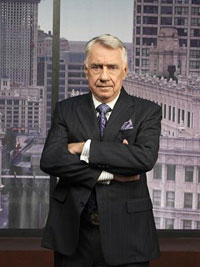
PBH: Gosh, I don’t know. I certainly love “Hard Eight.” That was his first feature film, so that’s kind of a special film, both for me and for him. But, God, I love “Magnolia,” too, and I love “Boogie Nights.”
BE: Is he very collaborative with actors, or is he very much of the “this is how I’d like to see my film, please do it this way” school?
PBH: Well, there’s something, I think, a little unique with Paul, and that is that he…I won’t say he doesn’t collaborate with actors, but because actors have so much respect and awe, really, about his writing and the kinds of characters that he creates and the multi-leveled writing that he does for these characters, actors are anxious to collaborate with him rather than the other way around. In other words, what I’m saying is that it’s very common to…well, I felt it myself in “Hard Eight,” and that was his first film, but I’ve seen it with other actors, too, in the other films. Let’s say have an idea, a different take on a scene than Paul does, and there’s your take and then there’s Paul’s take. It’s not uncommon in any film, big or small budget, famous or not famous, where the actors may just have a different perspective on a certain moment or a certain scene. Normally, actors will fight for that moment if they really believe in it. They may or may not win, but they’ll fight for it. With Paul, though, once you hear his side of it, you tend not to fight because his vision is so clear and so far reaching and so deep that you say, “Well, Hell…” I mean, I had moments like that, where I…I didn’t feel that I was wrong, but I felt that he reserved the right to have his vision up there rather than mine. And I find it’s true with other actors. He has a lot of respect from the greatest actors in the world for all kinds of reasons, but that’s one of them. They say, “Hey, anyone who wrote this scene or this moment or these bits of dialogue really has a bigger vision than I do.” So that’s the answer to that.
BE: Was the Library Cop role on “Seinfeld” a turning point as far as people appreciating you as a comedic actor?
PBH: Yeah, I think it was. I mean, I’d been active in the theater for so many years before that, both in New York and Los Angeles and in various regions around the country, and I’d played all kinds of roles. I mean, every imaginable kind of role, including the silliest and subtlest comedies. You name it, I’d done it. But for TV and for film, that was a turning point. It was, like, “Oh, okay, this guy can do comedy, too. Great!” Not understanding that I’d been doing that kind of thing for 25 years. But such is the way the world works. And it was a great thing to have that opportunity. And, you know, that was Episode 22 in their history. They were a mid-season replacement originally, so Episode 22, although you could say it was part of the first season in a sense, they called it part of the second season because they were a mid-season replacement. They were not high in the ratings at that time. They were probably down in the 50s or 60s somewhere. It’s just so funny looking back on that experience, because they expected to be cut at any minute. They had no idea that they were going to go on for many more years at that point.
BE: And last question: what’s your favorite project that you’ve done that didn’t get the love you thought it deserved, and why does it deserve that love?
PBH: Oh, my gosh, that’s interesting. Hmmm. I don’t know! In a way, maybe “Duck.” I mean, “Duck” is out there, and, actually, it just came into Blockbuster stores just last week, but I think we were hoping for a little more from “Duck.” It’s a better and more interesting film than it’s been given credit for, I think.
BE: Is there anything from deeper into your back catalog that stands out?
PBH: Well, I did a film a few years ago about an architect, called “A House on a Hill,” and that never really saw the light of day. The New York Times strangled it. (Laughs) That was kind of a serious film about an architect that didn’t really get much of a play at all. I was kind of disappointed by that, because I thought it was a really kind of radically interesting film. But, y’know, a film about an architect is not gonna put lines around the block. (Laughs) It got into some of the esoteric and fine points of architecture and its importance, socially as well as its practical functions. Kind of esoteric, but it was an interesting film nonetheless. But it really died. I don’t even know if you can find evidence of that anymore! (Laughs)
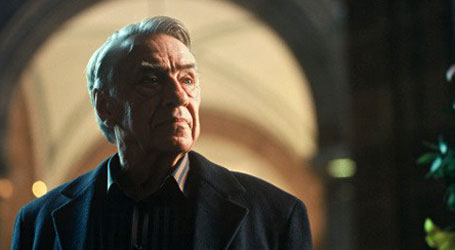
BE: I’ll find it!
PBH: Okay!
BE: Well, I’ve already kept you over the allotted time, but it’s been a pleasure talking to you.
PBH: Okay, and I hope everybody gets the chance to see “Duck.” It’s a film that I feel not only has some charm and wonderful actors on it but also has something to say – unfortunately – about the world we live in and that we’re about to live in.
BE: Anything else coming up that you wanted to trumpet?
PBH: Well, I have a lot of films in the pipeline. I have a film I just finished up with Ryan Gosling and Kirsten Dunst (“All Good Things”). That’ll probably be out…I think they’re going to try to get it out just before the Academy Awards, because Ryan is going to be, as usual, unbelievably brilliant in this film. And I have a film with Matthew Broderick that’s also in the pipeline and being edited (“Wonderful World”). I have, I think, four or five films in the pipeline. So I’ve got a lot of stuff coming up.
BE: So you’re keeping busy, in other words.
PBH: I am very busy.
BE: There are worse fates to have.
PBH: Yeah, really, for an actor! And, then, I have my Holiday Inn commercials keeping me going, too.
BE: Oh, and not to keep you even longer, but I had meant to ask you how those came about!
PBH: Hey, they created this character called the Professor of Business Accommodations, and they offered it to me, so I did it. It’s great. We did six or seven commercials in New York, and we did a whole bunch of internet stuff also.
BE: I know you were a teacher in a previous life.
PBH: Yeah, that life is getting further and further away from me! That’s really far away.
BE: Was that what you drew from when you were doing the commercials?
PBH: Oh, that life is so far back that I can hardly remember it!
BE: (Laughs) Okay, well, again, it’s been a pleasure talking to you, sir, and thanks very much!
PBH: Okay, Will! Thank you very much!You can follow us on Twitter and Facebook for content updates. Also, sign up for our email list for weekly updates and check us out on Google+ as well.
